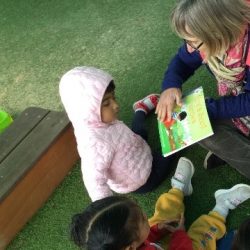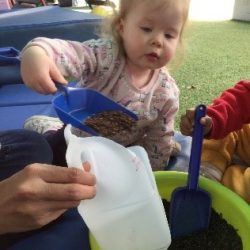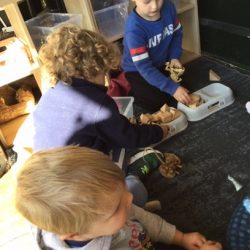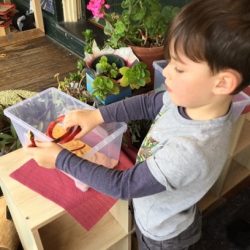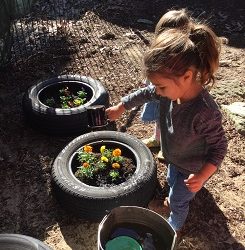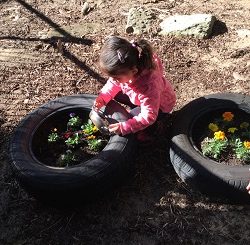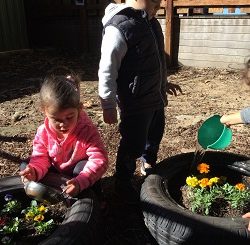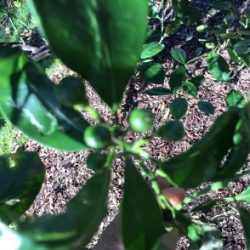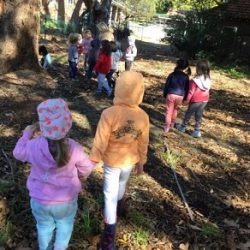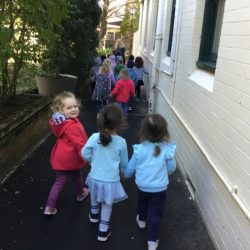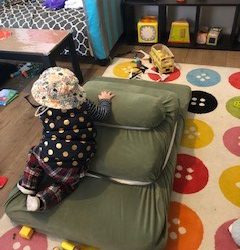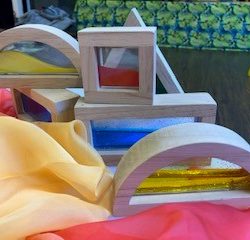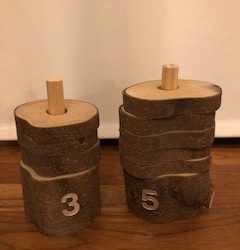Johnson House
Toddlers
How a Seed Grows
To continue to build and extend on the children’s existing interest and knowledge of living things, we shared a story about the lifecycle of a seed called ‘How a Seed Grows’. Holly shared this book with us and it was very valuable as a provocation for the children’s learning. As the children shared the story, it prompted a discussion about how small seeds are at the beginning of their growth cycle, and what the children thought they needed to grow. The children were prompted by the illustrations and they could recall their prior knowledge of living things as we discussed how all seeds need water and sun to grow into bigger plants, flowers or trees.
Preschool
The children in Johnson House Preschool have been involved in a project about pets. A learning area has been set up with a variety of provisions to help further encourage this interest. Photos of the children’s pets from home have been added to the space, which has promoted great conversations amongst peers. The children have been discovering the diverse range of pets that people can have, the foods they can eat and how best to care for pets. This area of interest continues to evolve, and the children have really used the environment and their conversations to extend on their learning and level of engagement in the space.
Murray House
Babies
This week in Murray house babies, educator Latha has focused on extending the children’s interest in sensory play and allowing sensory exploration through designing our sensory board. Latha collected materials to include in her sensory board that would stimulate the children’s senses, such as glitters, colours, oil and sand. The children seemed fascinated as they tracked the bubbles in the sensory bag and swirled around with their fingers. The children were tapping and rubbing to observe or to investigate the different textures and materials. Stamping was another method of exploration that our children loved. The new sensory board has supported the development of children’s learning dispositions, including curiosity, imagination and self-confidence. It has also encouraged the development of fine motor skills.
Toddlers
A few weeks ago, we re-purposed some old shoes and boots into pot plant holders. This week we created a new community garden in our yard with some recycled car tyres and various flower seedlings that were brought in by educator Deepa.
First, the children filled the tyres with potting mix, and the next day they sat around the tyres and discussed the flower seedlings as Deepa showed them what she had brought in. The children expressed their admiration for the flowers, “Wow! So pretty flower!” and “I like flowers”. One of the children asked, “Did you go to Bunnings?” which surprised Deepa (because indeed, she had bought them from Bunnings!). She asked, “Why do you ask me that?” to which the child replied, “I buy flowers from Bunnings!” Deepa pointed at Bunnings outside of our fence and she shared that she had bought the flowers from Bunnings. Deepa told the children the name of the flowers—marigolds, pansys and petunias, and she explained that these flowers only bloom in the Australian winter.
The children each took a turn to plant the seedlings. First, they dug a hole, and then with Deepa’s support transferred the seedlings from the pot to the tyre-garden bed. Gardening offers many learning opportunities for children, such as developing a sense of responsibility as they learn that plants die without water, hence they need to water them. Digging dirt, and touching and feeling seeds and flowers is also a sensory learning experience.
The day after the planting experience, the children remembered they had planted some seedlings in the garden. They visited their garden to check on their flowers. One kissed a flower, while another had a closer look and suggested some of the plants need water. The children got a bucket of water and some watering cans to water their plants, and when this was done some of them continued to sit next to the flowers admiring their beauty.
Robinson House
Celebrating NAIDOC week by looking after Wangal Land
This year’s NAIDOC Week (7-14 July) theme was ‘Voice. Treaty. Truth. Lets work together for a shared future.’ As the children in Robinson House have been learning about recycling and ways to look after the natural environment, we took the opportunity to remind the children that we’re on Wangal Land and we spoke them about how the Aboriginal people looked after the land for thousandd of years by looking after all creatures and their home in the natural environment and only taking what they needed from the land to save resources for a later time.
We took the children out for field walks around The Infants’ Home grounds. The children used their senses to taste, smell, feel, and observe flowers, plants, trees, lavender, rosemary, bay leaves, and kumquats. They were very tempted to pick the flowers and the young kumkats. However, they remembered to let them grow and to save these for a later time.
Family Day Care
The importance of embedding sustainable practices into their service is something that all Sydney Wide Family Day Care educators are aware of. During the month of ‘Plastic Free July’ (a campaign led by the Plastic Free Foundation) there have been some very thoughtful uses of resources to reflect this. From investing in natural materials that have been ethically sourced and produced, to recycling and re-purposing materials, it is clear that our educators are keen to promote the message that sustainability can begin at home and have a ripple on effect upon the local and broader community.
Educator Lindsay has refashioned a discarded mattress and cushion set to become a hardworking, soft climbing frame for the toddlers and infants in her care, while educator Allison chose to invest in beautiful, natural resources that have been sustainably and ethically produced and will last for many, many years. Even the Inner West Hub Coordination Unit got involved, producing stacking toys using wooden rounds sourced from a local garden! These resources all celebrate the importance of environmentally friendly practices in Family Day Care Sydney Wide, and are saying an emphatic NO to the use of plastic materials!
